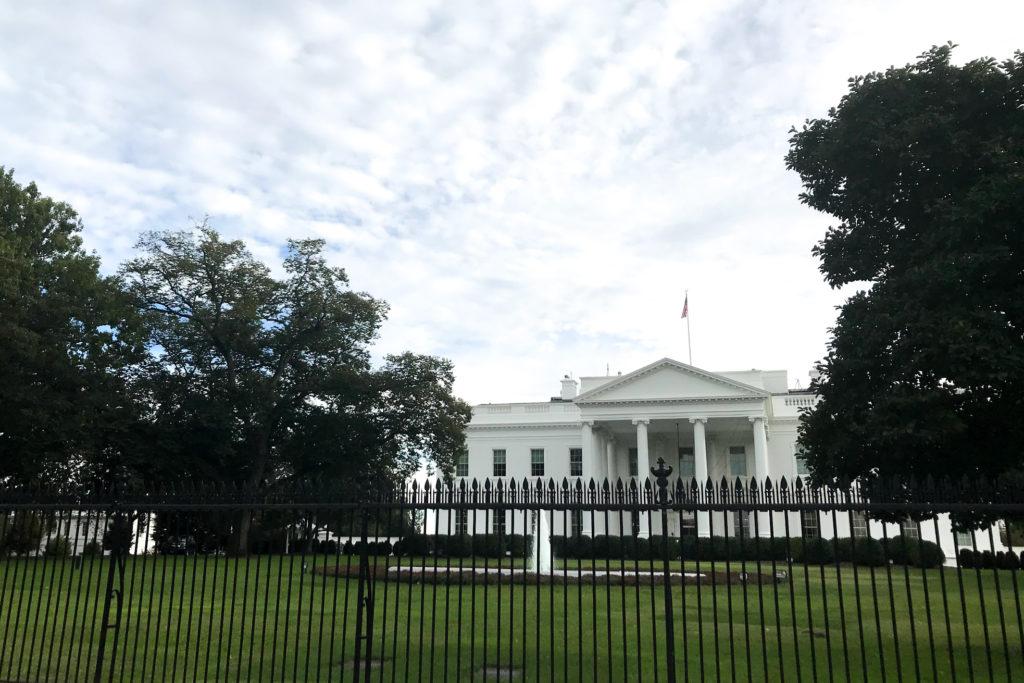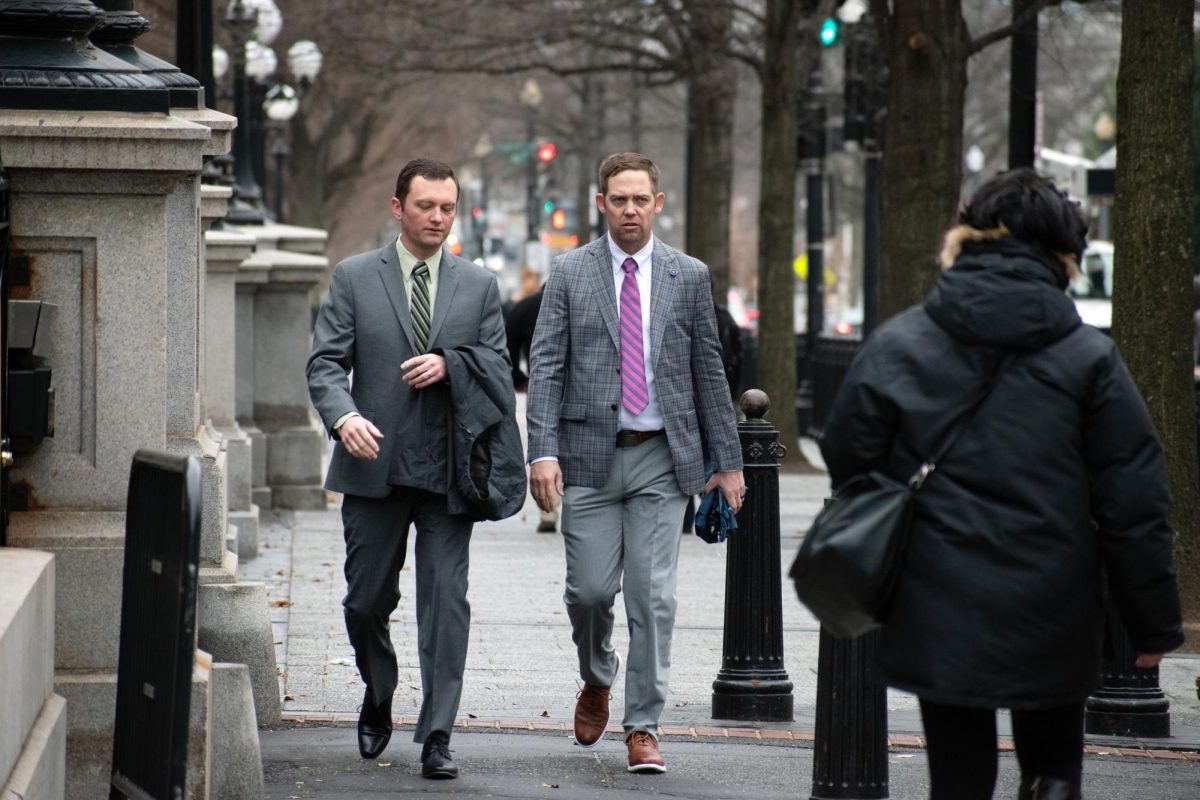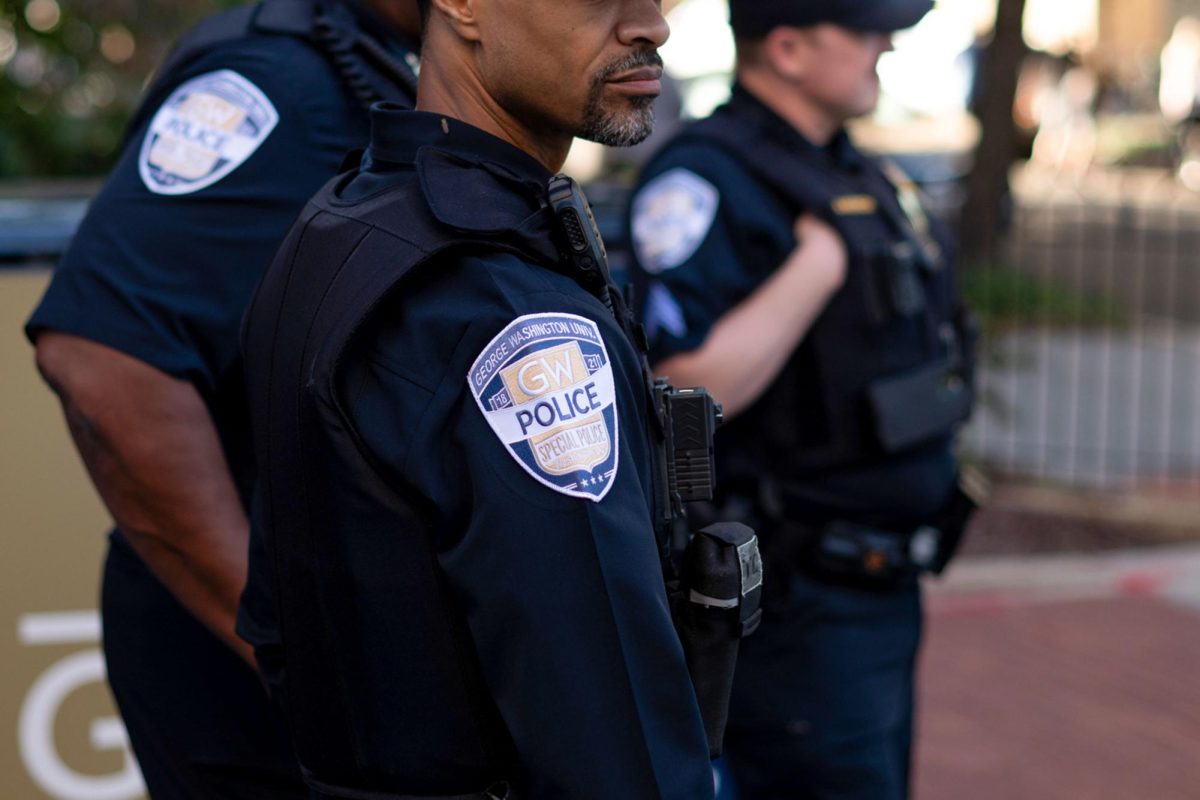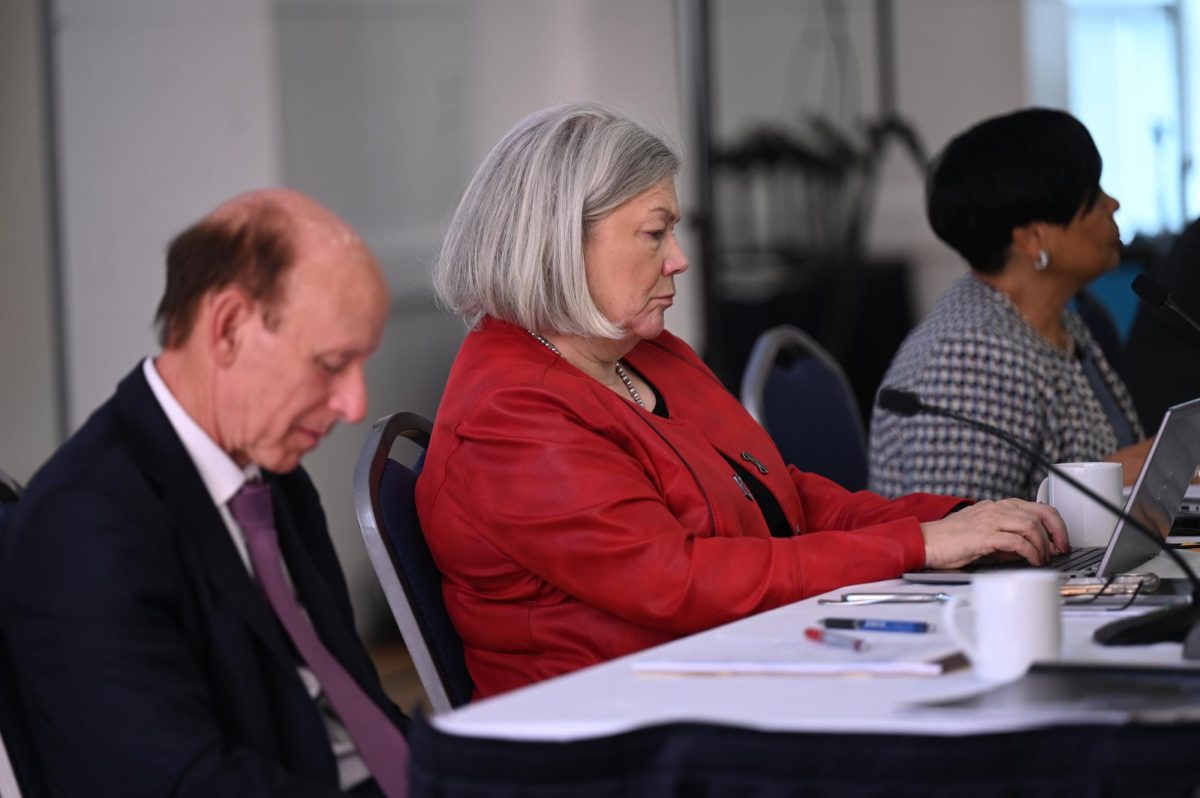About 90 percent of students prefer Democratic presidential nominee Joe Biden in office over President Donald Trump, according to a Hatchet survey of more than 180 students conducted last month.
More than 87 percent of students said they intend to cast their vote for Biden, while just more than 8 percent said they hope to reelect Trump, according to the poll. Students said the COVID-19 pandemic, racial justice movements and the worsening effects of climate change have motivated them to vote in hopes of removing Trump from office.
The Hatchet distributed the poll through multiple social media platforms like Twitter and Facebook and circulated it across several campus newsletters from groups like GW College Democrats, GW College Republicans, Sunrise GW and the Nashman Center for Civic Engagement and Public Service. Responses were accepted from Oct. 6 to Oct. 31.
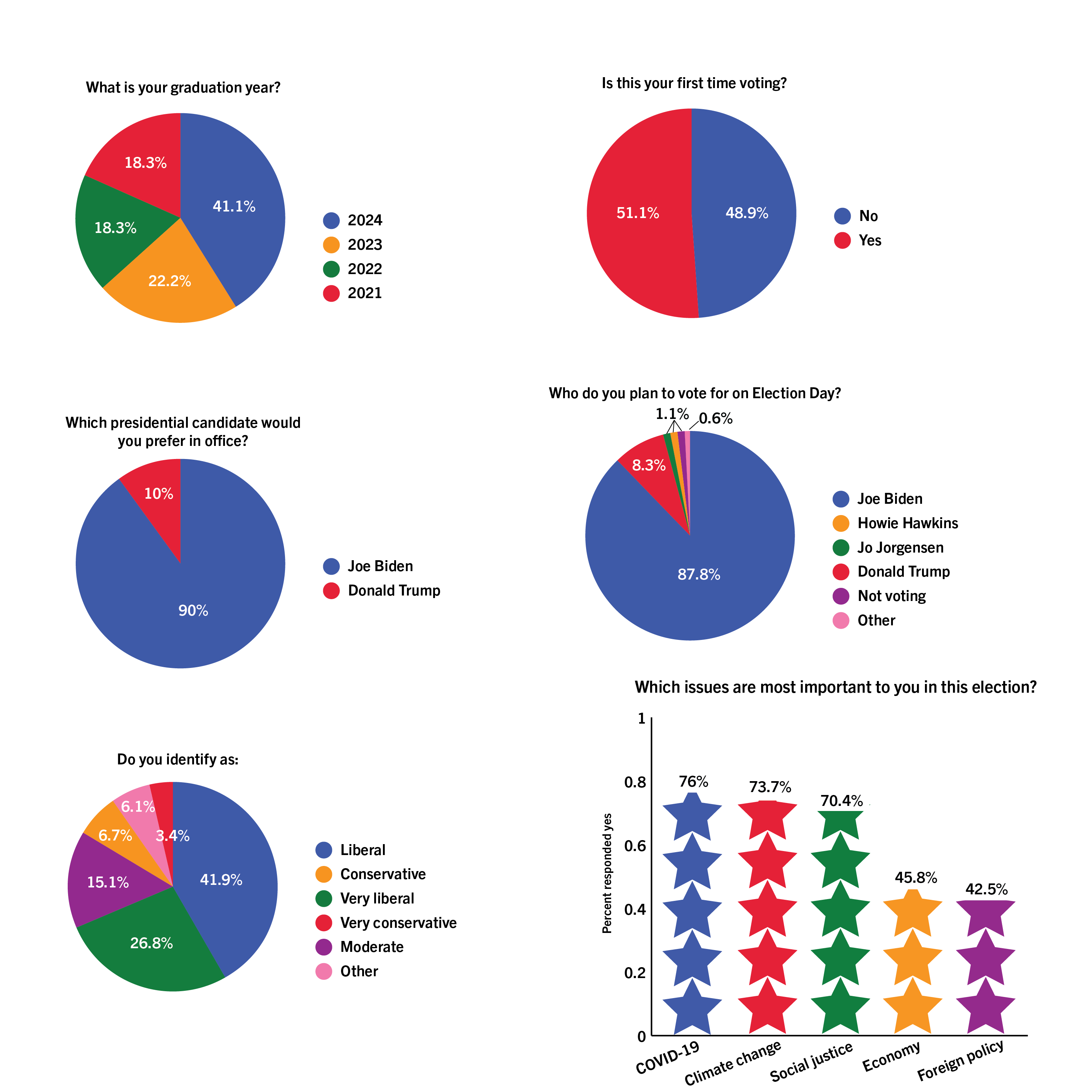
Sidney Lee | Graphics Editor
The poll did not capture a random sample of the population, so The Hatchet has not provided a margin of error for the result.
The survey included a question in which students could select which national issues they find most important in the election, including the COVID-19 pandemic, the economy, social justice, climate change, foreign policy and other issues they could add in an open response box.
Roughly 75 percent of respondents identified the pandemic and climate change as critical issues that influenced their decision-making for their preferred candidate. More than 70 percent of students stated they were passionate about social justice, while the economy and foreign policy respectively drew about 46 and 43 percent of students’ votes.
Students noted LGBTQ and women’s rights and health care as other crucial national issues during the election cycle.
Four students said they plan to vote for either Libertarian Party nominee Jo Jorgensen or Green Party nominee Howie Hawkins, and two students said they don’t intend to vote in the election.
Students were invited in the poll to leave their contact information if they were interested in speaking further about what was motivating them this election cycle.
Sophomore Chloe Stemler – a political science major from Arcata, California – said she is voting for Biden because she believes he will be more effective than Trump in halting the climate crisis, an issue deeply personal to her due to the fires on the West Coast.
“The treatment of that situation by President Trump has been so disrespectful and demoralizing,” Stemler said. “I think Joe Biden is much better suited to handle this and listen to the science.”
Despite the direct impact of the wildfires on her personal life, Stemler said social justice has become the most crucial national issue for her. As racial justice protests have drawn tear gas from law enforcement and opposition from Trump, she said students need to recognize the dangers Trump’s potential second term could have on American lives.
“There are plenty, millions of Americans, who are in danger if he does win again,” Stemler said. “That’s an important thing for people to realize, especially in the GW community, as they decide to vote.”
South Carolina native and junior Catherine Morris, who studies political communication and noted the pandemic as the most serious issue in the election, said Trump’s response to COVID-19 has been “less than adequate,” while Biden would have been able to more properly handle the early stages of the pandemic.
“I think we really need a president who can lead by example during times like these and listen to the scientists,” Morris said. “To not listen to the people hand-selected to give you that guidance is really not doing your job.”
Morris said recent months have illuminated Trump’s inability to handle issues like the pandemic, climate change and systemic racism, which she said he’s handled with “Nixon-era law and order.”
Majority support for the Democratic nominee is not a new occurrence on GW’s campus, but the extent of Biden’s lead may be. In 2012, then-President Barack Obama rallied the support of 68 percent of students compared to 20 percent for the Republican nominee – former Massachusetts Gov. and current Utah Sen. Mitt Romney. In 2008, Obama led then-Senator John McCain 74 percent to 20 percent, according to a Hatchet poll.
Nearly 69 percent of respondents identified as either “liberal” or “very liberal,” 15 percent identified as “moderate,” 10 percent said they’re either “conservative” or “very conservative” and 6 percent selected “other” for their political ideology.
Some students discounted Biden’s overwhelming lead in the survey as representative of the total student population, but most said it was likely not far off from the reality of the student body. Morris said GW has a largely liberal student body.
“I definitely think that in a poll of the entire student population, Biden would win, and by a significant majority, but I don’t know if it would be quite that high,” she said. “I’m definitely not surprised it is an overwhelming majority.”
Freshman Eyad Sleem, who’s studying international affairs and political science from New York, said foreign policy and the judiciary have motivated him to vote for Trump during the election. As a first-generation American whose parents are both from Lebanon, he said Trump has handled terrorism in the Middle East in “the best way any president can.”
Sleem said he doesn’t think American life has been damaged by Trump’s presidency, noting how his own quality of life has progressed in the last four years through an increased feeling of security in finding a job before the pandemic began.
“I thought that this election was made out to be a referendum on his four-year term as president, but I really thought that everything I was listening to that can be done in four years to harm Americans hasn’t happened,” he said. “I feel like my life is better than it was four years ago.”
Junior Connor Leary, a political communication major from New York, said although the student body has a significant liberal skew, Biden has been able to build a coalition across party lines. Leary said the survey’s results displaying nearly 90 percent of student support for Biden don’t surprise him amid an election he said is more about leadership than partisan politics.
“I don’t think this is necessarily an election about whether you’re liberal or conservative,” he said. “I think a lot of people at GW know that Joe Biden, no matter whether you have problems with him, is eons above where Trump is, so that doesn’t shock me at all.”
Leary said he voted for Biden and hopes the election will help guide the country toward a recovery from Trump’s term in office.
“I just think that Trump is a trainwreck,” Leary said. “I knew that I wasn’t going to support him if he won, but since 2016 he’s somehow gotten even worse, which I didn’t even know was possible, but here we are. So I think Biden is a consensus builder and that he will actually get stuff done, which is why I am hopeful that he will be elected.”


